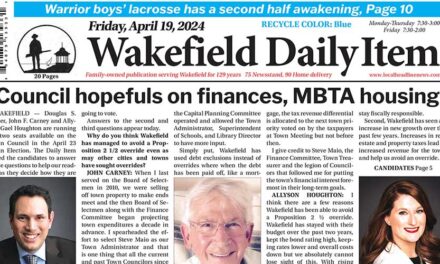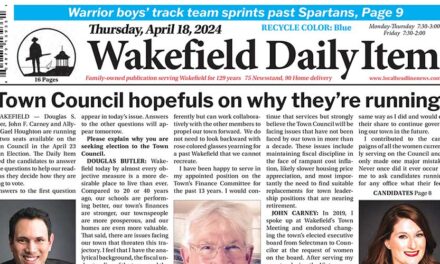Published in the November 25, 2015 edition.
By MARK SARDELLA
WAKEFIELD — Wakefield’s three state legislators spent more than an hour with the School Committee last night, engaging in a wide ranging discussion of education-related topics from the Chapter 70 funding formula to high stakes testing and the PARCC vs. MCAS debate.
Joining Rep. Paul Brodeur and Rep. Donald Wong, Sen. Jason Lewis began by summarizing the conclusions of the Foundation Budget Review Commission that recently wrapped up its review of the Chapter 70 formula and issued its recommendations.
Lewis noted that the Chapter 70 formula for distributing state aid to public education was created in 1993 under Education Reform Law. The problem, he said, is that the formula hasn’t been updated to account for such things as soaring health care and special education costs and the technology explosion.
The bipartisan state commission recommended an infusion of nearly $500 million into state educational funding to address of issues that have arisen in the last 20 years. Lewis said that the next step is for the legislature and the Governor to decide how to implement those recommendations. He predicted a more phased in approach over a number of years rather than any sudden large infusion of funds.
Commissioners have said that the money could go toward things like smaller class sizes and longer school days as well as toward shoring up schools in poorer districts.
Brodeur called the financial numbers “eye-popping.”
“Everyone knew the answers would be expensive,” Brodeur said. He agreed with Lewis that there probably would not be a sudden, large infusion of new money dedicated to education funding.
School Committee member Greg Liakos noted that the original focus of the Chapter 70 formula was to help poorer cities like Holyoke and Lawrence. He wondered where that leaves a town like Wakefield that is neither as poor nor as affluent as some communities.
Brodeur agreed that the original goal was to close the achievement gap but noted that education had changed dramatically in the last 20 years and needs constant attention from state and local budgets.
School Committee member Thomas Markham said that in his view funding special education has proven to be an even bigger challenge for local school districts than the soaring costs of employee health insurance. He noted that Wakefield has been kicking in more money for education and that has in turn helped some in terms of Chapter 70 receipts.
Brodeur praised Wakefield’s 11 percent increase in this year’s School Department budget. He especially lauded the investment in tuition-free all-day kindergarten. But he acknowledged that there is a very real concern that well-managed communities don’t always get rewarded from a state aid perspective.
School Committee member Anne Danehy raised the question of the discrepancies in Chapter 70 funding between demographically similar communities like Wakefield, Reading and Melrose.
“What’s different in Wakefield from Reading and Melrose that has them getting so much more?” she asked.
Wong agreed that the state should start to reevaluate the cities and towns in terms of the funding distribution.
Lewis said that he would be interested in seeing a more detailed recommendation from the Department of Education. He admitted that just fixing the foundation budget issues would not address the whole problem of inequities between communities.
Moving to the subject of charter schools, Lewis noted that there is a ballot initiative underway to allow more charter schools in the state. He said that he expected that the proponents would succeed in collecting enough signatures to get the question on the November 2016 ballot.
School Committee member Christopher Callanan said that he was not against charter schools but he regretted the way it has become a competition for money between public school districts and charters.
Brodeur noted that the legislature has not been able to find a consensus on charter schools and said that he suspects that it reflects a similar lack of a public consensus on the issue.
The School Committee and the legislators also discussed the PARCC vs. MCAS debate and the recent state Education Commissioner Mitchell Chester’s recommendation to go with some sort of hybrid of the two tests.
Brodeur noted that with Massachusetts schools rated among the best in the nation, many have wondered why any consideration was given to changing how testing is done. But he noted that despite the quality of the schools, a significant percentage of Massachusetts students entering college still need to take remedial courses before they are ready to do college level work.
Lewis said that he hoped that the MCAS vs. PARCC/Common Core debate would be used as an opportunity to take a broader look at testing. He acknowledged the importance of testing but said, “We don’t want to overdo it.”
Markham said that he would oppose any effort to place a moratorium on testing, saying it would hamper the ability of communities to see what they are getting for their investment in education. “Accountability and assessment need to be hand in hand,” he said.
Liakos asked about a legislative initiative that would place a moratorium on the consequences of assessments for three years while the MCAS vs. PARCC issue is sorted out.
Wong stressed the importance of thoroughly vetting any standards before imposing them on schools.
“We really should research things before we dump it on teachers and kids,” he said.
But Brodeur observed that standards and testing are “always a work in progress. We need a continuing conversation.”
Superintendent Kim Smith agreed. She said that standards are important but they need to continue to evolve.
“We need to find a test that will best align to the the standards that we are teaching,” she said.




